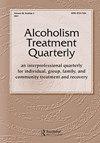酒精和危险物质使用障碍个体的内化耻辱和自尊
IF 0.9
Q4 SUBSTANCE ABUSE
引用次数: 1
摘要
摘要本研究的目的是确定酒精和危险物质使用障碍患者的内化污名和自尊之间的关系。该研究的样本由233名被诊断为酒精和物质使用障碍并正在接受住院或门诊治疗的人组成。研究人员的社会人口学信息表、库珀史密斯自尊量表(CSEI)和精神疾病内部污名量表(ISMI)应用于参与者。该研究的数据于2021年5月10日至12月31日在酒精和药物成瘾研究、治疗和教育中心(AMATEM)亲自收集。参与者的平均CSEI评分为39,51±11,84,平均ISMI评分为78,70±9,70。失业人员的社会退缩得分高于退休人员(p<0.05),社会退缩与自尊呈正相关r=0.172,研究发现,酒精和危险物质使用障碍患者的自尊和内化污名为中度,自尊与社会退缩和污名抵抗的ISMI分量表呈正相关。本文章由计算机程序翻译,如有差异,请以英文原文为准。
The Internalized Stigma and Self-Esteem in Individuals with Alcohol and Risky Substance Use Disorder
ABSTRACT The objective of this study is to determine the relationship between the internalized stigma and self-esteem in individuals with alcohol and risky substance use disorder. The sample of the study is consisted of 233 individuals who have been diagnosed with alcohol and substance use disorder and are undergoing inpatient or outpatient treatment. The researcher’s Socio-Demographic Information Form, Coopersmith Self-esteem Inventory (CSEI) and The Internalized Stigma of Mental Illness Scale (ISMI) were applied to the participants. The data of the study was collected in person between 10th of May – 31st of December 2021 at the Alcohol and Drug Addiction Research, Treatment and Education Center (AMATEM). The mean CSEI score of participants was 39,51 ± 11,84, and the mean ISMI score was 78,70 ± 9,70. It was discovered that the social withdrawal scores of the unemployed are higher than those of the retired (p < .05). There was a positive correlation between social withdrawal and self-esteem r = 0.172, and stigma resistance and self-esteem r = 0.14 (p = 0,033 < 0.05). It was found that the self-esteem and the internalized stigma experienced by individuals with alcohol and risky substance use disorder were moderate, and there was a positive correlation between self-esteem and the ISMI subscales of social withdrawal and stigma resistance.
求助全文
通过发布文献求助,成功后即可免费获取论文全文。
去求助
来源期刊

Alcoholism Treatment Quarterly
SUBSTANCE ABUSE-
CiteScore
1.60
自引率
11.10%
发文量
31
期刊介绍:
Alcoholism Treatment Quarterly is an exciting professional journal for clinicians working with persons who are alcoholic and their families. Designed to bridge the gap between research journals and information for the general public, it addresses the specific concerns of professional alcoholism counselors, social workers, psychologists, physicians, clergy, nurses, employee assistance professionals, and others who provide direct services to persons who are alcoholic. The journal features articles specifically related to the treatment of alcoholism, highlighting new and innovative approaches to care, describing clinical problems and solutions, and detailing practical, unique approaches to intervention and therapy.
 求助内容:
求助内容: 应助结果提醒方式:
应助结果提醒方式:


